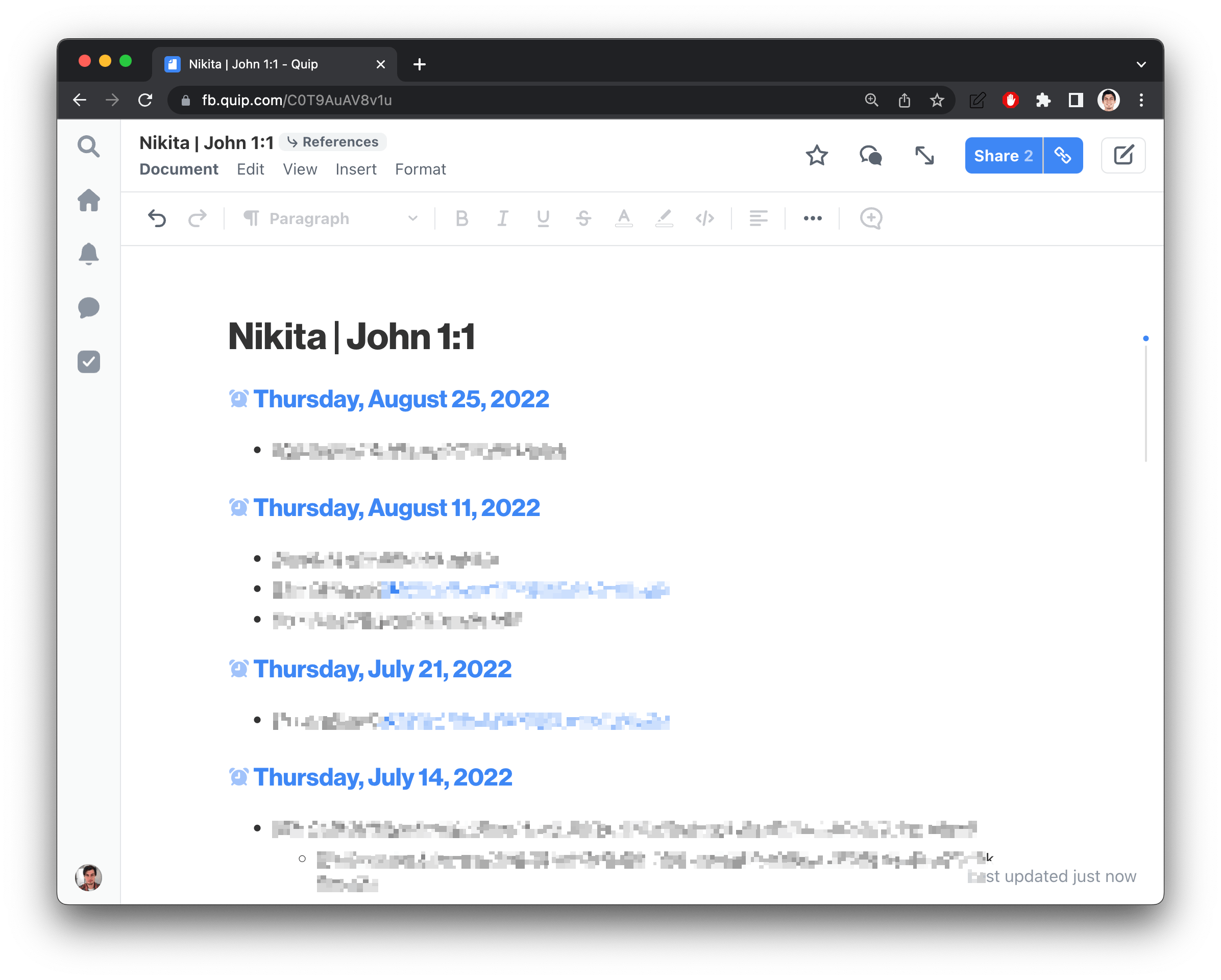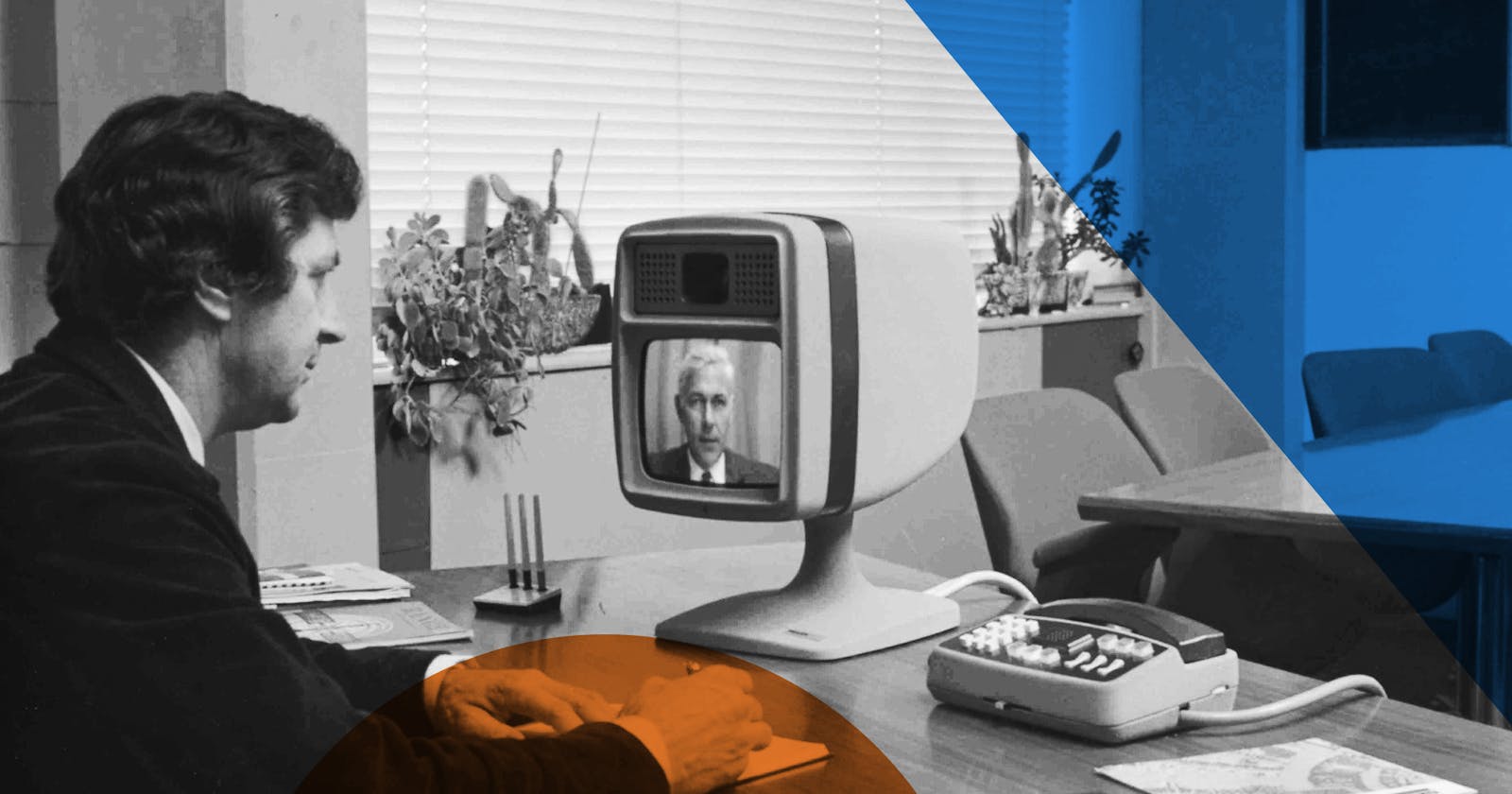Hi, my name is Nikita, for the last 10 years I’ve been working in big tech companies, currently working for Meta. I started my journey at Yandex as an intern and went all the way to becoming a senior engineer and a team lead.
I’ve been doing 1:1 meetings both as an engineer and as a manager, and I’ve made mistakes on both sides. In this article I want to talk about the top 3 things you might be doing wrong as an engineer during 1:1s with your manager.
1. Not having an agenda
Use your manager as your best tool
Your engineering manager is there to help you. Supporting their team is the manager’s first and foremost responsibility. Think of your manager as a tool helping you achieve your goals. It’s powerful and very expensive, and not using it properly or not using it at all is counter-productive. Use your manager to achieve your goals!
Add agenda items between meetings
I have a shared doc with every person I have 1:1s with, the doc is literally named something like ‘Nikita | John 1:1’. And anytime between the meetings when I think ‘oh we need to talk about X’ I just put another line into the agenda. By the time the meeting starts, the agenda is already there.

Use agenda as a task tracker
Sometimes during a conversation you may come up with action points for you or your manager. And we all know there’s a lot on your plate already, same for your manager. So there’s a non-zero chance that you or your manager can forget some of the action points. That’s why it’s important to track your agreements.
Helps writing peer feedback
When performance assessment season comes and you have to write peer reviews, these notes will be super useful. In those notes you’ll find concrete examples where they have supported you, or you provided support. Or maybe examples of issues you’ve raised, but your manager wasn’t able to support you.
Sometimes no agenda is fine
Sometimes it’s fine to have a meeting without an agenda, and just have a light talk about things that matter to you personally. Such meetings are still useful! They help you build a stronger relationship with your manager, which will help you in the future.
2. Not asking the hard questions

Taking it lightly
You may tend to be polite, to talk about ‘normal’ things or mundane project status updates. 1:1 is not the place for this! 1:1 with your manager is the place where you must be 100% honest and talk about things that really matter to you. It can be hard sometimes, and it can be uncomfortable, but that’s the whole point of this meeting. This is useful for your manager as well: you can give them a clear signal that he or she cannot receive elsewhere.
Examples of tough questions
‘That person I’m working with is annoying me...’
‘I don’t feel that I’m doing something useful’
‘I’m burned out, I’m not productive, I procrastinate a lot’
‘I want a raise’
Sometimes it's okay to discuss personal things
Sometimes you may need to share personal things with your manager. If you’re going through a hard time with your partner, or you or someone you’re close with are having health problems. It’s personal, but it affects your work as well. And this is one of the reasons why it’s important to build trust with your manager: so that when you need it, you’ll be comfortable talking about any topic.
Don’t talk about any topic you can discuss in the open
This piece of advice is mentioned in the great article The Art of the Awkward 1:1 by Mark Rabkin. If something can be discussed in a standup meeting or sent via an email, better not take it to 1:1. Instead talk about ‘hard’ topics which will more likely move you forward.
If you feel uncomfortable speaking out in public, say it in 1:1
Sometimes you feel that something isn’t quite right about a project or your team’s roadmap, but you don’t feel comfortable talking about it in a big meeting. 1:1 is the perfect place to discuss this with your manager. If you share this signal with your manager, they can act upon it. If you don’t there’s no way they know that something might go off track.
‘I’m a pro, I can handle it myself'
Sometimes engineers might think being a professional means that they can solve any problem and shouldn’t talk about the obstacles they face. Quite the opposite! Being a senior engineer means reflecting upon yourself, knowing your limits and knowing where you need help to achieve your goals.
Don’t accumulate frustration
1:1s is a perfect place to vent. If you don’t share your thoughts and don’t have your questions answered for a long period, the frustration accumulates and eventually you reach a point where you only want one thing: to quit that job. Don’t get yourself to that point, share your concerns as they arise, and don’t build frustration.
Or keep it light
Sometimes it’s fine to just have small talk. You’ll get to know each other better, which is useful anyway. Also, the conversation might lead you to unexpected areas. This usually happens when I’m talking with my therapist: if at the beginning we don’t have any particular topics and it seems to be a ‘light’ talk, in the end the talk magically touches very deep topics.
3. Skipping with no good reason

1:1s are NOT optional
Some engineers and managers may think that 1:1s are optional. I had the same thoughts a few years back: I was a team lead in a small team and I thought I don’t need to set up 1:1s with engineers in my team, I can use my time better. I thought if we were on good terms, and if something is bothering them, they can talk to me any time.
This works most of the time, but without 1:1s I was missing important signals from engineers, and the level of trust we could build was limited.
Your manager is your most powerful tool
As an engineer, you have a certain toolset: your laptop, your favorite code editor, your favorite framework, programming language, compiler and so on. You’ve spent some time picking them and learning how to use them properly. Think of your manager as one of the tools in your toolset. It’s actually very powerful (and very expensive), so learn how to use it for your benefit. If you need to find PoC in a different org, if you’re unsure that you’ve picked the most impactful work, or if you lost your motivation — use your manager, he or she is there to help.
But I have no time for 1:1s
Think of your priorities. As a manager, 1:1s with your team should be the most important meetings on your calendar. When planning your week, start by scheduling your 1:1s. If you’re an engineer, demand time with your manager and try to make the most of it.
Make sure your meetings are useful
You might want to skip your 1:1s because you’ve done them before and didn’t find them valuable. This is a problem, and skipping is not the best solution. Your manager’s job is to answer your concerns, give clarity, and give direction when you ask for it. If your questions remain unanswered, then gradually you might lose trust and the meetings become a burden. Try to push a little bit harder, leave notes and demand the support you need. If the situation doesn’t improve, think about changing the team.
If you have no agenda, have a smalltalk
If you don’t have any particular topics to talk about, don’t skip the meeting. Just have a small talk over a cup of coffee. Knowing your manager as a person, building trust is super-important. Every once in a while a team goes through challenges: a reorg, change in priorities, or even layoffs. When the hard time comes, you’ll have your manager as a friend by your side.
Give reasons when canceling the meeting
Sometimes you have to cancel 1:1 meetings. It’s a good practice to let the other person know why rather than simply removing it from the calendar. This way you show your respect and how valuable is the time with that person for you.
I hope my advice helps you avoid common pitfalls on your journey to effective 1:1s
